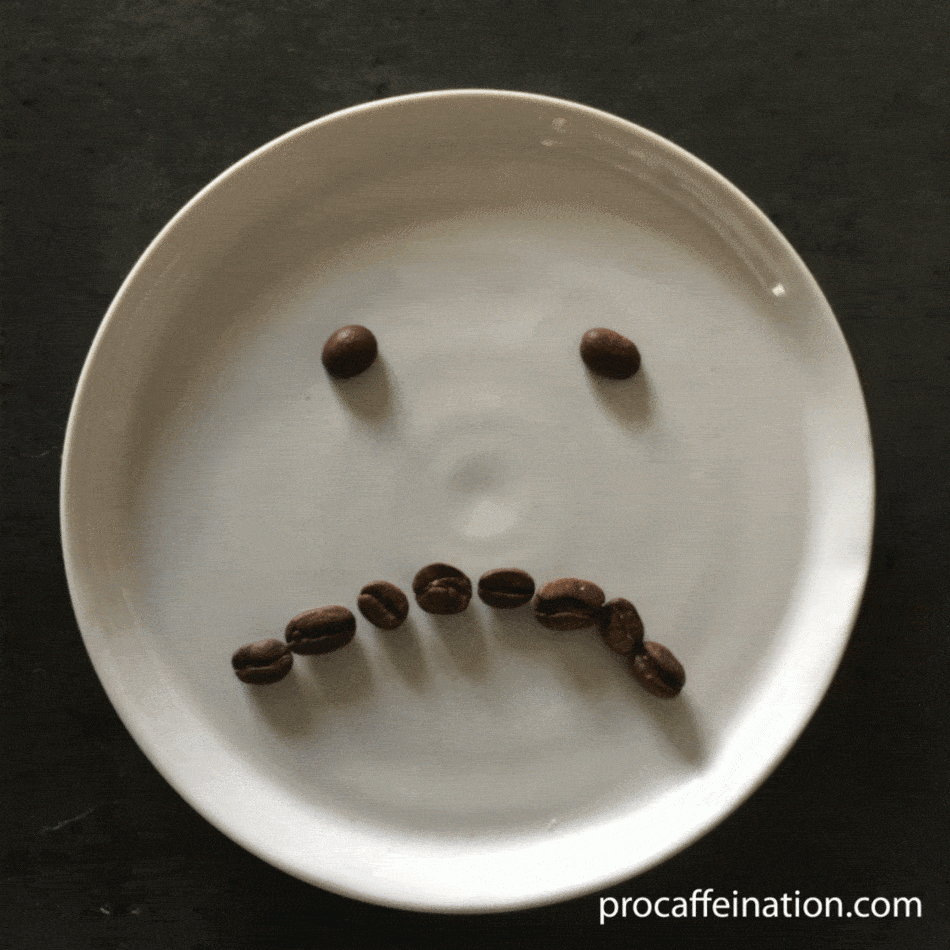
It seems like almost every other day an article comes across my feed claiming that coffee is bad for your health. This is not something I spend too much time worrying about because I can be certain, as sure as the sun rises in the east, that an article touting the health benefits of coffee is not far behind.
Whether or not coffee is “good for you,” too much coffee can have some obvious effects on our bodies. I did some digging and compiled this rather exhaustive list of things to watch out for just in case. Keep in mind, I am not a doctor. I am just some smart-aleck who likes coffee, has a scientific outlook, and a rather large curiosity.
If you would rather have the funny version of this topic, check this out!
Coffee and Anxiety
While many of us enjoy the energy boost we get from a jolt of caffeine, increased agitation is one of the first signs that your coffee intake might need a closer look.
Hormonal Influences
One of the direct effects of caffeine consumption is the triggering of the hormones cortisol and adrenaline. The release of these two chemicals can result in a short-term stress response leading to an increased heart rate. It is not uncommon for the ultra-caffeinator to find themselves with shaky hands and jittery sensations in their body. There’s even a word for it: caffeinism!
Along with the anxiety, you might also find yourself with a shorter-than-usual temper. That same adrenaline surge that keeps you alert can make you irritable and prone to lashing out. If you are already quick to anger, caffeine might not be a good addition.
Psychological Instability
If you are one us who drinks multiple cups of coffee every day, say five cups or more, you may find yourself with mood and emotional issues such as anxiety and depression. In fact, studies have suggested that the symptoms are virtually the same as those found in people suffering from a diagnosable anxiety disorder. According to a study conducted by Melbourne’s La Trobe University, that much coffee coupled with high levels of stress were causing people to exhibit symptoms of schizophrenia, including hearing things.
Since everyone is unique and caffeine tolerances vary with the individual, there is no hard and fast rule as to how much is too much. When it comes to caffeine-induced edginess, your mileage may vary. Only you know you, so you are going to have to monitor your reactions in order to moderate your intake as needed.
Coffee and Insomnia

While a nice hot cup of coffee is a great short-term solution for forestalling sleep, too much coffee can lead to true sleep difficulties, such as insomnia. Caffeine keeps us alert by hijacking part of the brain. As we go about our day, our body produces adenosine which binds to adenosine receptors in the brain. When the receptors are full, we are sleepy. When we sleep, the adenosine is “washed away” and we are alert again. The peculiar thing about caffeine is its similarity in structure to adenosine. In fact, it is so similar that it can also bind to the adenosine receptors, effectively blocking the adenosine from binding. The combination of this blocking and the stimulating effects of boosted adrenaline production keeps us alert and awake. That’s fine and dandy when we want it, but what about when it’s 3 am and you would rather be sleeping? Not so much.
On average, the human body metabolizes half of the consumed caffeine in about 5 hours. After an additional 5 hours, it’s down to a quarter. But that’s only an average; some people take much longer. If you are especially sensitive to caffeine, or if your body takes longer to do the metabolism trick, you may find yourself affected long into the night – or even into the next day! Think about it: It is possible that your morning coffee could be keeping you up at night, which makes you need to have coffee in the morning, which keeps you up at night, which… Well, you get the picture. While that might only be true in extreme cases, if you find yourself tossing and turning when you should be experiencing eight hours of dreams, it may be time to reconsider your coffee habits. Maybe no coffee after 1 pm?
Coffee and Digestion
Let’s get this out the way, right away. Coffee does make you poop. There is, however, some disagreement about the mechanism that makes this so. It may be due to the warmth of the beverage causing relaxation in the digestive tract. It may be caused by the inherent fiber in the liquid. It seems most likely, however, to be due to various hormonal and/or neural responses to coffee that stimulate the peristaltic movement of the colon. Additionally, too much coffee in a short period can also cause diarrhea. In short, a cup of joe makes you go.
Coffee Causing Stomach Aches
Your stomach produces large amounts of acid to help in the digestive process. Unfortunately, coffee is itself acidic and research suggests that compounds in coffee may stimulate additional acid production in the stomach. For those with sensitive stomachs, too much coffee can lead to pain and may even lead to the erosion of the stomach lining. Although studies have not shown a clear linkage between coffee drinking and ulcers, irritation of existing ulcers is a concern. There is a clear connection between smoking and ulcers and since many people smoke while drinking coffee (the breakfast of non-champions), it may be a case of correlation and not causation.
That excess acid in your belly, coupled with a bumped up blood pressure and a bit of dehydration, might just give you a queasy stomach and in higher doses, can progress to nausea. The FDA, which also cautions that STOPPING coffee consumption can lead to nausea, concurs. Nausea is a typical physiological response to the cessation of any physically addicting substance. That’s right: you are suffering from withdrawal. So, your stomach is subpar, you eat less, and you lose weight. You heard it here: losing weight can also be a sign that it is time to examine your coffee consumption more closely.
The upshot is that while small to moderate amounts of coffee can improve gut motility, too much might lead to loose stools or other gastric disturbances.
Coffee and Muscle Issues
At this time, there is no definitive link between coffee drinking and muscle spasms or cramps. However, caffeine can impede your stomach’s ability to absorb magnesium. Guess what a deficiency of magnesium can bring about: muscle cramps! It is important to note that stimulants, such as caffeine, can cause any muscle in the body to twitch. Research conducted at Radboud University Nijmegen Medical Centre in the Netherlands has suggested that there is a linkage between high caffeine consumption and involuntary muscle spasms.
Although rare, there have also been several cases of Rhabdomyolysis, a serious muscle disease, linked to high caffeine consumption. Rhabdomyolysis is usually caused by physical damage to muscles and results in dead muscle fibers moving into the bloodstream which may lead to kidney failure. If you are not a regular, high-volume coffee drinker, suddenly increasing your intake might be a problem.
Addiction
Coffee contains caffeine which is a stimulant to the central nervous system and can be both physically and psychologically addicting. While it may be one of the only socially acceptable addictions in our society, that does not make caffeine addiction less problematic to those who are afflicted. Since caffeine doesn’t result in harmful drug-seeking behaviors the way addictive drugs do, in general, it doesn’t cause concern.
If you stop taking caffeine without weaning yourself off, you may have withdrawal symptoms for a day or more. These might include:
- headache
- fatigue
- anxiety
- irritability
- depressed mood
- difficulty concentrating
For the most part, I take a pretty lighthearted approach on this website. Addiction touches many families and when it affects you or someone you love, it is not a laughing matter. This is not medical advice and I am not a doctor; I’m just some smart aleck who likes coffee. See your healthcare professional or a counselor who can help.

Coffee and High Blood Pressure
Caffeine has been shown to raise blood pressure and that makes sense when you consider that it is a stimulant. Stimulate the adrenal glands, more adrenaline. More adrenaline, higher blood pressure.
Another theory is that caffeine blocks the production of the hormone that helps widen the arteries. Smaller arteries, higher pressure. The effect may only be temporary but, as the nurse at the blood drive told me: “If you are drinking coffee every day, then your blood pressure is elevated every day.” Researchers at Wageningen University in The Netherlands have linked coffee consumption of over five cups a day to increases in blood pressure. This could potentially increase the risk of hypertension and stroke, which makes it worth monitoring and cutting your consumption if necessary.
Rapid Heart Rate
Much like blood pressure, increased heart rate can be the result of too much caffeine. Are the two conditions related? Do yourself a favor: if you notice something out of whack, seek medical advice and maybe cut back on the double espressos.
Fatigue
We generally drink coffee for two things: the flavor and the BOOST! As we have mentioned, caffeine is a central nervous system stimulant and blocks the receptors in the brain that make us sleepy. It gives us a little extra “OOMPH” to make it out the door in the morning or through that after-lunch meeting. Of course, when the effects wear off, we may find ourselves in a sluggish state. A more worrisome thought, though, is that chronic and excessive caffeine intake can repeatedly trigger the sympathetic nervous system. We know this as the “flight or fight response.” It may cause an additional level of fatigue.
Too much coffee also can interfere with much of our internal chemistry. Coffee can interfere with the absorption of thiamine, our potassium levels, and our electrolyte balance. These can all be sources of weakness, fatigue, and even fainting. As we mentioned in the insomnia section, coffee can potentially interfere with sleep causing a vicious cycle of sleeplessness and coffee consumption. One study at the University of British Columbia even suggested that excessive coffee intake caused laziness in rats!
Frequent Urination and Urgency
High caffeine intake has been linked to increased urinary frequency and urgency in several studies. Add to that the large liquid component of coffee, and you have a recipe for trouble.
Coffee and Headaches
While coffee can be good for knocking back a headache – Excedrine has caffeine in it – headaches are more common when NOT drinking coffee. Remember what we said about addiction? Once your body gets used to a certain amount of caffeine not having it can lead to a throbbing headache. But what if you did not skip your morning pour over? The combination of increased blood pressure and a little dehydration might be the culprit.
For those who suffer from migraines, the situation is a bit more complicated. While caffeine is a known migraine trigger, according to recent research, a couple of cups are not likely to set one off. Researchers found that it takes three cups of coffee to increase the chance of an episode and if you are “doing pretty well” two cups will not increase the likelihood of an attack.
Metabolic Issues
Coffee and Cholesterol
There are well over 1,000 chemicals in brewed coffee. While we are all familiar with caffeine, which comes to about 100 mg in a mug, the chemical that affects our cholesterol levels is the 10 mg of cafestol in that same mug. Cafestol blocks a receptor that is responsible for regulating cholesterol in our systems. One study suggested that five cups of French press coffee consumed daily over four weeks could increase cholesterol by 8%.
Iron Deficiency
Coffee, or rather, the caffeine in coffee has been shown to interfere with the body’s absorption of iron. Over time, an iron deficiency can mean less oxygen getting to the body’s cells, resulting in fatigue, weakness, pale skin, bruising, and even anemia. Those adhering to a plant-based diet should pay particular attention to their timing when drinking their coffee. Iron can be harder to come by and you do not want to interfere with it reaching your system.
Insulin Resistance
While some research suggests that drinking coffee may reduce your risk of developing diabetes, excessive coffee consumption may lower insulin sensitivity. Lower insulin sensitivity can lead to high blood sugar levels because your body does not do a good of absorbing dietary glucose. On top of that, coffee causes more glucose to be released. This is not a good combination.
Vision Problems
That spike in blood sugar levels might also translate into blurred vision. Combined with the boost in blood pressure, there might also be an increase in interocular pressure. The Glaucoma Research Foundation suggests that drinking five or more cups of caffeinated coffee a day may increase the risk of developing glaucoma and recommends that those at an elevated risk of glaucoma watch their intake. Untreated, this can lead to irrevocable vision damage or even blindness.
Stained Teeth
It is almost always a good idea to smile, but coffee might be causing a few problems with your pearly whites. The acids in coffee can reduce the minerals in the enamel of your teeth, leading to erosion over time. Coffee can also get trapped in the microscopic ridges of the enamel, forming stains and leading to yellowed or stained teeth. It is so common, the dentists even have a name for it: coffee stains. They recommend brushing after your morning cup to keep your smile looking its best.
Weight Gain
Coffee is a great way to eat less. It is a mild appetite suppressant and minor caffeine consumption has been shown to be useful for weight loss. But overdoing it might have the opposite effect. According to research published in the Journal of Agricultural and Food Chemistry, drinking five or more cups of coffee a day can increase your risk of developing excess belly fat. Another study at the University of Western Australia also showed a possible link between that high consumption level and metabolic syndrome – high blood pressure, high blood sugar, excess belly fat, and high cholesterol levels.
Dehydration and Excessive Sweating
While not usually caused exclusively by one’s coffee intake, the secondary effects of dehydration on the cardiovascular system should not be ignored. Hyperhidrosis or excessive sweating might be a side effect of caffeine’s stimulation of the nervous system. A ramped-up body is going to produce more heat and eventually more sweat. Plus, as we mentioned earlier, caffeine can interfere with your body’s magnesium absorption, another cause of excess perspiration.
Of course, there is another method that your body uses to remove liquid from itself. Over time, frequent urination can lead to serious dehydration. In turn, dehydration can lead to everything from muscle cramps, cognitive difficulties, heart rhythm issues, to chronic dry mouth leading to tooth decay and dull, lifeless skin.
So How Much is Too Much? What is safe?
The Mayo Clinic says about 400 milligrams of caffeine per day is generally regarded as safe for most healthy adults. Unfortunately, how that works out in terms of cups of coffee is not a straightforward calculation. What type of coffee are you drinking? Robusta coffees can have four times the caffeine level of Arabica coffees. Even coffees of the same varietal can have a range of caffeine levels. How are you brewing your coffee? Espresso? Drip? Cold brew? But here is the biggest factor to consider: how big is your cup?
A standard, brewed Arabica coffee, prepared at the golden ratio of 11 g of coffee to 200 ml of water (2 tablespoons of coffee to 6 ounces of water) will have 71 milligrams of caffeine. That is if you are drinking out of a 6-ounce teacup. An 8-ounce cup from a takeout place will net you 95 milligrams of caffeine. And that Venti from Starbucks? 240 milligrams of caffeine. If you are serious about monitoring your caffeine intake, measure how much coffee your mug holds.
By the way, tea, energy drinks, and many colas have caffeine, too; sometimes a LOT of caffeine. Check out the caffeine database to see how much.
What About Decaf?
Decaf does not mean NO caf. Decaffeinated coffees have less caffeine than the regular versions, but they still contain some caffeine. Being “97% Caffeine Free” still means 7 mg of caffeine per 8-ounce cup. If you are caffeine sensitive, watch your intake.
Conclusion
Remember, I am not a doctor. I am just some smart-aleck who likes coffee, has a scientific outlook, and a rather large curiosity.
Moderate coffee intake appears to provide impressive health benefits in many people. It is the number one source of antioxidants in the western diet and it is great for your skin. It is important to remember, however, that more isn’t necessarily better. For some – and it varies from person to person – caffeine can cause or exacerbate health issues ranging from nervous agitation to metabolic syndrome.
To get the benefits of caffeine without undesirable effects, conduct an honest assessment of your sleep, energy levels and other factors that might be affected, and reduce your intake if needed.
I once saw a short film about someone trying to commit suicide by drinking 60 cups of coffee. Clearly, that would be too much and death would be a pretty bad “health issue.” Much worse than “trouble sleeping.” Just in case you want to know, this calculator can tell you how much of a caffeinated beverage you can drink before it will kill you!

